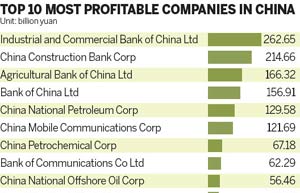|
 |
|
An employee at the administration for industry and commerce in Lianyungang, Jiangsu province, explains corporate registration procedures to company representatives. All companies will have to provide more information to regulators on an annual basis. [Photo/China Daily] |
Official says new regulation aims to improve public access to information
A regulation mandating expanded corporate disclosure will take effect on Oct 1, the top official of the State Administration for Industry and Commerce said on Tuesday.
The rule, enacted on Aug 7, is an important step in the reform of the commercial registration system and a basic step to improve the regulation of companies and public access to corporate information, Zhang Mao, head of the SAIC, told reporters in Beijing.
The goal of the regulation is to use public disclosure and credit reporting to make companies more accountable, broaden public access to data and improve government regulators' efficiency, said Zhang.
The new regulation includes the following provisions:
??Companies must file their annual results with the SAIC by June 30 of the following year.
??The annual reports must include the company's official address, outbound investment, operational status and other information.
??Companies are responsible for the accuracy and legality of their reports.
??The SAIC will conduct random reviews of the reports.
??A complaint and reporting system for such information will be established.
??The SAIC will publicize a list of companies that fail to file reports, or those that file reports omitting or falsifying information. Such companies will be classified as those operating "abnormally".
??Companies that remain in "abnormal" status for three full years shall be classified as serious violators of the law, and a list of such enterprises will be released. Legal representatives of such enterprises will be barred from serving for three years.
??Companies will be able to revise their annual reports. If they find errors or omissions, they must file "timely" revisions and release the original and revised versions simultaneously.
??Enterprises can be removed from the "abnormal" list if the reasons they were put there no longer exist within three years from the day they were placed on the list. The same applies to the list of serious law violations.
At the news conference, the SAIC also reported some results from the Reform Plan for Capital Registration System, which was issued by the State Council, the country's cabinet, in March.
About 6,900 enterprises were registered each day last year. But this year, between March and July, about 10,500 companies were registered each day, said Zhang.
That reform has lowered the cost of capital and improved the capital efficiency of companies, he said.
 |
 |
|
|
|
